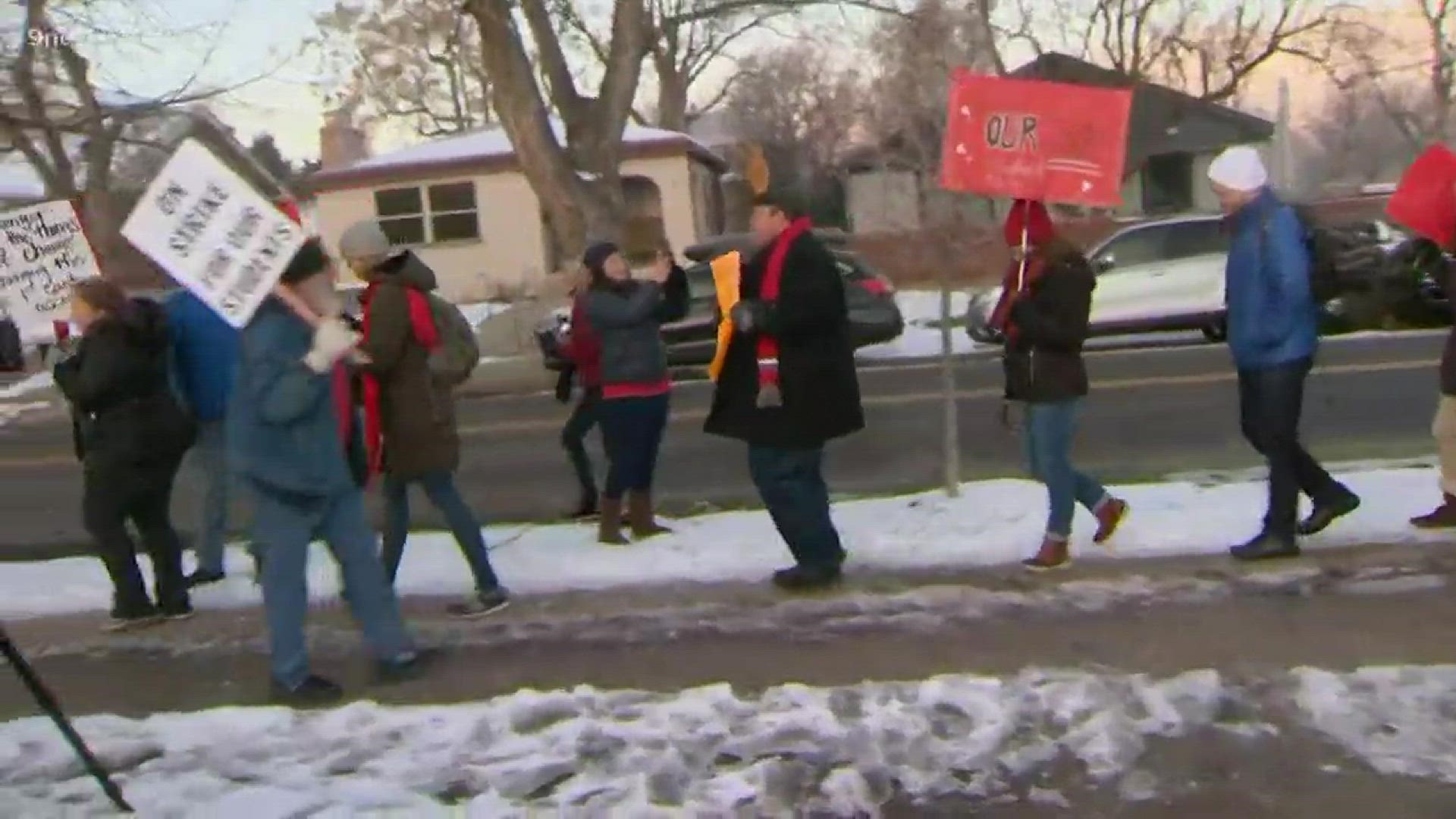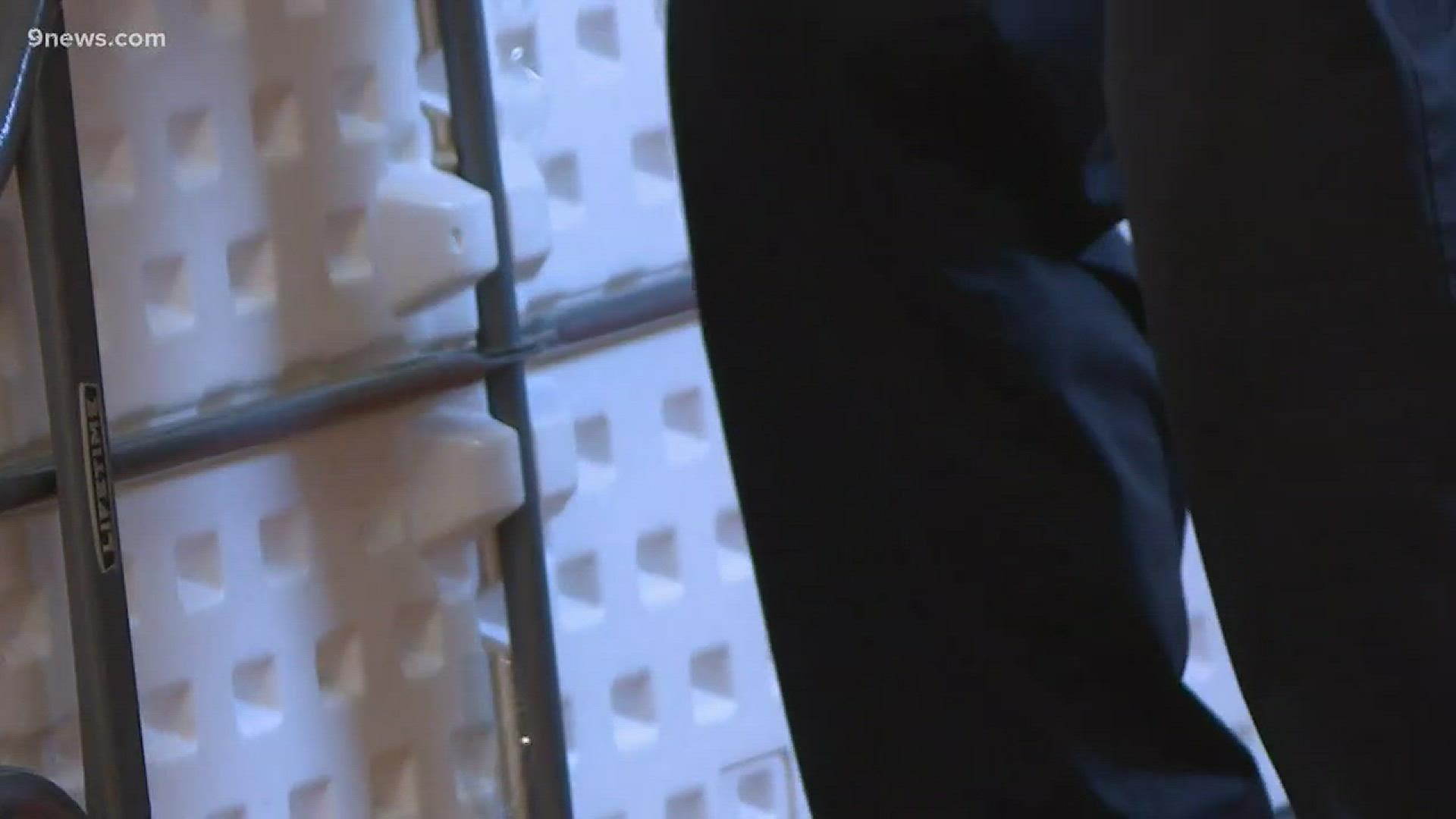DENVER — More than 2,600 Denver teachers have called out of work on Monday, day one of the first strike Denver Public Schools teachers have gone on in 25 years. Union representatives said more than 3,700 educators and support staff walked out of classrooms.
DPS leaders returned to a half-empty bargaining table Sunday morning despite being told by the teachers union that they won't negotiate again until Tuesday - at least a day after the teachers strike has been in swing for a full day.
After six hours of negotiating on Saturday, teachers and union representatives left empty-handed, each saying they were disappointed in the other side.
In a Sunday morning email to students' families, DPS outlined the Saturday proposal to teachers. According to the district, the new deal responds to what teachers have told them they'd like, empowers high-poverty schools to hire and retain teachers and coincides with the ProComp ballot language passed by voters.
The Denver Classroom Teachers Association - the teachers union - made a counteroffer, neither party could decide, and negotiations stalled as they have done in the run-up to the strike.
DPS publicly announced they would be returning to the bargaining table Sunday despite DCTA's assurance they would not talk to the district again until Tuesday.
THE VERY LATEST | What's happening during the first day of the Denver teachers strike
On Monday, hundreds of students at South High School joined their teachers on the picket line as the district called in hundreds of substitutes and administrative staff to manage the teacher-less schools.
Schools like Hamilton Middle School divided its 800 students between its auditorium, gymnasium and cafeteria. Six substitutes were sent to the school.
According to the superintendent, the latest offer from the district - to cut 150 administration jobs and use that money for teacher compensation, to invest $55 million over three years in teacher pay (which would be almost an 11 percent salary increase) - adhered to the requirements of ProComp, the portion of the teachers' contract that is currently under negotiation.
In a blog post, DCTA excoriated the latest offer from the district, saying that despite the district repeating over the last few weeks that they were listening to teachers, leadership made an offer to the union that made the situation worse.
"Given the opportunity [Saturday] to avert a strike with a transparent, competitive proposal, DPS made the situation worse and the strike inevitable," the post reads.
Almost 3,000 of the district's 4,300 teachers are a part of DCTA. The district's 92,000 students are being taught by substitutes and administration staff brought in to help. Cordova is adamant students will still learn but was clear that Monday would not be a "normal" day.
"I don't want to pretend like that's the case," she said on 9NEWS Sunday. "Any time students' teachers aren't in class, it's not going to be a normal day and obviously there's going to be a lot of disruption outside of school."
In an email to parents on Sunday, the district again gave parents some suggestions on how they might mitigate the trouble caused by the strike. Parents are asked to remember that DPS staff will be at each campus to make sure students are safe during the school day. Students in grades Kindergarten through 12th Grade should attend school as normal, but pre-school classes are canceled; parents won't be charged tuition while ECE classes are out. All DPS schools will provide their normal services like meals, transportation and Discovery Link before and after school programs. Any parents interested in volunteering with their local school during the strike are asked to head to this link to apply.
There is also a Family Helpline set up for people to call. It’s open between 8 a.m. and 4:30 p.m. and the number is 720-423-3054.
While Cordova maintains that incentives are liked by some teachers and has continued to push them during negotiations, DCTA President Henry Roman was unhappy with DPS' insistence on incentive pay.
"We are disappointed that on the last day of bargaining and less than two days before a strike, they doubled down on one-time incentives teachers do not want, and the data shows do not work to keep teachers in school," Roman said in DCTA's Saturday blog post.
A look at the DPS strike by the numbers:
- More than 1,400 central office team members will be deployed to Denver classrooms
- DPS said it’s recruited more than 300 guest teachers. That’s in addition to the 1,200 already on the active roster this year.
- Each day that teachers are striking, DPS estimates it could cost over $400,000. That includes the cost of paying substitute teachers, the amount paid to provide strike curriculum and materials and the loss of ECE revenue.
- All together, Denver teachers and Special Service Providers (SSPs) are paid $2 million a day in compensation. A striking teacher would lose, on average, $400 per day in pay.
- DPS has 5,353 teachers and SSPs (social workers, psychologists, speech-language pathologists, etc.)
- Substitutes would be paid double the regular substitute pay during a strike, $212 a day. Retired teachers would be paid $250 a day.
This strike will be the first in 25 years - since 1994 - that Denver teachers have walked out of their classrooms. That strike lasted five days. That first Friday, according to a New York Times report, more than a third of the district's 63,000 students were missing school.
The 1994 strike was also the first in 25 years at the time. DPS' 107 schools were without about 2,200 teachers, forcing the district to call in 1,200 substitutes and 1,500 regulars to cross picket lines and assist with classes.
Back then, Democratic Gov. Roy Romer asked a court to force the teachers back to work but was rebuffed - something current Democratic Gov. Jared Polis can still do. After that first Friday, according to the Times, Romer brought both sides to the negotiation table and hammered out a deal.
Teachers got a 2.15 percent pay increase for the first year but have their work year lengthened by 10 days to 190, the Times reported. After the first year, salaries had to be renegotiated. At the time, teachers wanted an $8 million, two-year pay package based on seniority. The contract they got amounted to $5.1 million.
Just a month ago, the country's second-largest school district saw a teacher strike. About 35,000 teachers from the Los Angeles Unified School District walked out of their classrooms to demand better pay. During that strike, some parents kept their students out of school for solidarity and practical reasons. The strike cost the district $97 million and lasted seven days.
Some schools held classrooms in auditoriums because they were so understaffed. While Superintendent Cordova stressed that won't be the norm in Denver, at least one school - Brown International Academy - is planning to hold classes in its auditorium, gymnasium and hallways. Brown International Academy is in northwest Denver and has classes from preschool up to fifth grade.
While many parents are still figuring out what to do with their children, a local church is offering child care and preschool for parents during the strike.
Highlands United Methodist Church in Denver is licensed to provide preschool for up to 45 kids. Pastor Brad Laurvick hopes to have approval from the state sometime on Monday to welcome another 30 children.
“As soon as we get the letter from the state that says, ‘you’re good to go,’ we’ll contact the families and tell them we’ll be ready to open within two hours," Laurvick said.
On Sunday afternoon, Laurvick and members of the church helped convert the large fellowship hall into two classroom spaces. Laurvick said he'd already heard from several DPS teachers who offered to help teach.
“I have teachers who, though they may be picketing in the morning, are coming over here and are going to be volunteering to be our staff,” Laurvick said.
The church will only be able to accommodate up to 30 students, and Laurvick said the program would prioritize families most in need.
SUGGESTED VIDEOS | Local stories from 9NEWS


